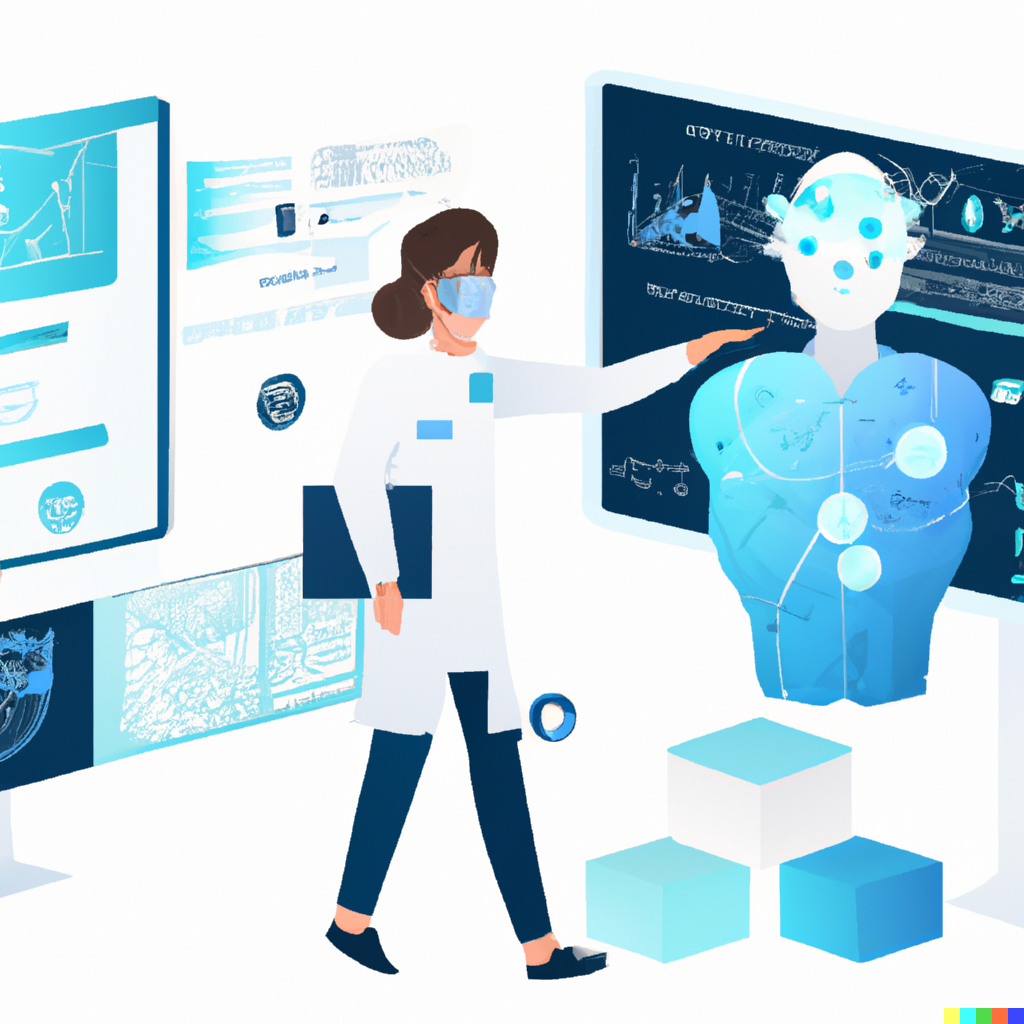
Artificial intelligence (AI) is rapidly transforming healthcare innovation, leading to groundbreaking advancements in diagnostics, treatments, and drug discovery. Imagine a future where diseases are predicted before they manifest, treatments are tailored to individual patients, and new drugs are developed at an unprecedented pace. This is the potential of AI in healthcare. AI offers solutions to improve quality, accessibility, and cost-effectiveness in healthcare. This article will delve into how AI is contributing to innovation in healthcare, exploring key applications, challenges, and future trends. The structure will cover the definition of AI in healthcare, examine the benefits and issues, and showcase concrete examples of its application. We will also discuss future projections for AI in the industry.
The Definition and Scope of AI in Healthcare
What is Artificial Intelligence in Healthcare?
Artificial intelligence (AI) in healthcare encompasses a broad spectrum of applications using advanced algorithms and machine learning techniques to enhance medical practices. These include diagnostic tools, treatment planning, drug discovery, and patient care management. AI’s role spans from supporting routine tasks to tackling complex medical challenges. AI’s influence has the potential to transform healthcare delivery dramatically, increasing efficiency, and improving patient outcomes. AI models can analyze vast datasets, identify patterns, and predict outcomes, revolutionizing healthcare processes.
Early Applications and Their Impact:
Early applications of AI in healthcare, like image recognition for disease detection, have yielded promising results. AI algorithms excel at identifying subtle patterns in medical images, leading to early and accurate disease diagnosis. Studies show AI-powered systems are often more efficient and less prone to human error when evaluating medical images, surpassing the performance of human radiologists in certain contexts.
AI-Powered Diagnostics and Treatment Planning
AI-Driven Diagnostic Tools:
AI is revolutionizing medical diagnostics by analyzing complex data, including medical images, patient records, and genetic information, to support more accurate diagnoses. Using machine learning, AI can identify patterns and anomalies that may be missed by human clinicians. AI has shown potential in detecting diseases like cancer at earlier stages, leading to improved patient outcomes. AI algorithms have the potential to detect and classify different diseases with high accuracy, potentially reducing misdiagnosis rates.
Personalized Medicine:
Artificial intelligence is paving the way for personalized medicine. AI systems can analyze individual patient data, including genetics, lifestyle, and medical history, to tailor treatments and predict responses to specific medications. This approach aims to create more effective and efficient patient care, and reduce adverse effects.
Drug Discovery and Development Acceleration
AI in Drug Discovery:
AI is being used to accelerate the drug discovery process through identifying potential drug candidates, predicting their effectiveness, and designing clinical trials. AI algorithms analyze massive datasets of chemical compounds and biological information, significantly speeding up the identification of compounds with therapeutic potential. AI-driven modeling can predict drug efficacy and potential side effects. This approach can dramatically reduce development time and costs, potentially leading to more effective therapies for diseases that currently lack effective treatments.
Advanced Research in Clinical Trials:
AI can be applied to optimize clinical trial design and execution, ensuring efficiency, reduced costs, and improved patient recruitment. By analyzing data from various sources, AI can predict which patients are most likely to respond to a treatment, allowing researchers to focus their efforts on the most promising candidates.
The Ethical Considerations of AI in Healthcare
Ensuring Data Privacy and Security:
One of the critical considerations in AI’s use in healthcare is maintaining data privacy and security. As AI systems process sensitive patient data, it is crucial to develop robust security measures and ensure compliance with data protection regulations. This involves using encryption, secure storage, and access control mechanisms to protect patient confidentiality.
The Importance of Algorithm Transparency:
The transparency of AI algorithms is also crucial. Understanding how AI systems arrive at their conclusions allows for greater trust and scrutiny, potentially improving public health outcomes. This helps in identifying potential biases, errors, or limitations that might affect the accuracy of AI’s predictions or recommendations.
The Future of AI in Healthcare
Continued Research and Development:
The future of AI in healthcare hinges on continued research and development. Ongoing advancements in AI technology will further enhance its capabilities, potentially leading to more advanced diagnostics, targeted therapies, and personalized treatments. Ongoing research into AI’s use in healthcare may lead to breakthroughs in managing and treating conditions like diabetes or Alzheimer’s disease.
Global Collaboration for Scalability and Accessibility:
Global collaboration is essential to ensure that the benefits of AI in healthcare are accessible to all. Sharing research findings and best practices among different countries can help in scaling up AI applications and making them widely available. Increased collaboration between researchers, healthcare providers, and technology companies can bring new possibilities in the future of AI and healthcare.
Frequently Asked Questions
How will AI impact the role of healthcare professionals?
AI is expected to augment, not replace, the roles of healthcare professionals. AI can assist in routine tasks, provide second opinions, and help in early disease detection, freeing up healthcare providers to focus on patient care and complex cases. This partnership between humans and AI offers significant potential for improving the quality of healthcare and reducing costs.
What are the biggest challenges in deploying AI in healthcare?
Challenges include data privacy and security, algorithm transparency and bias mitigation, and ensuring equitable access to AI-powered healthcare. Implementing effective ethical frameworks and data governance policies is essential for the successful implementation of AI in healthcare. Ensuring data integrity and quality, and addressing potential biases within algorithms is critical.
In conclusion, artificial intelligence is revolutionizing healthcare innovation, creating opportunities for faster diagnosis, personalized treatments, and more effective drug discovery. By embracing AI’s potential, healthcare professionals and institutions can drive significant improvements in patient outcomes and overall healthcare systems. For future research, exploring the ethical implications of AI in healthcare is crucial to ensure responsible development and deployment. To delve deeper into this transformative technology, consider exploring specific applications and the ongoing evolution of AI in healthcare. Learn more about AI-powered solutions by visiting [website address].